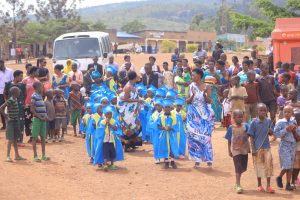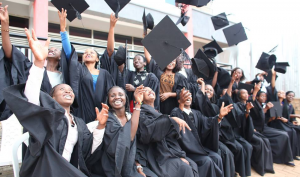Leading Rwanda: Creating, Communicating and Realizing your Vision
By Jeremy Solomons (for the New Times newspaper in Kigali, Rwanda)
“If your vision is for a year, plant wheat. If your vision is for a decade, plant trees. And if your vision is for a lifetime, plant people” (African proverb)
“A large eye does not mean keen vision” (Rwandan proverb)
“Vision without action is just a dream. Action without vision just passes the time. Vision with action can change the world.” (Joel Barker)
One of the key things that distinguishes leaders from managers is their ability to see beyond themselves and their day-to-day tasks and have a broader view of the world around them and their role within that greater universe.
Just last week, the influential Time Magazine named the 16-year-old Swedish climate activist, Greta Thunberg, as its 2019 Person of the Year for “showing us all what it might look like when a new generation leads … by clarifying an abstract danger with piercing outrage.”
This is what we call “Leading with Vision” or having a clear view of an ideal or desired state and/or of a place where a person really wants to be in future.
Here in Rwanda, young social entrepreneur, Joseph Dusabe, sees Vision as: “the umbrella of all things that helps me to fight for what I want.”
Rwandan recording artist and youth educator, Jean Paul Nduwimana (aka Noopja), sees Vision as: “the thing that gives you life and brings real answers to real problems.”
Jean Paul says this is particularly important for young people in post-Genocide Rwanda where “we all need to conquer fear and give youth hope with a strong vision of a brighter future.”
His personal vision is in the preface to his 2017 book “Keep it Up – A Letter to President Kagame”: “I’m a civically trained artist among the youth; I’m the protector of Gihanga’s heritage; I’m an artist Rwanda is proud of; and I’m at the forefront in rebuilding Rwanda; as well as striving for Africa’s development.”
Some might call this arrogance or even foolishness but Jean Paul sees this as an overt expression of his identity, his passion and his commitment.
So how do you create a vision for yourself as a current or future leader?
Joseph believes that the vision has to start from deep within you, often from your own personal experience. As a young boy near Kayonza, he struggled at school due to malnutrition and low quality education. From that experience, he developed a vision to have at least one pre-school for vulnerable children in every district in Rwanda where “the children will all be healthy, love school and be loved by their teachers and parents.”
Once you have done your inner work, Joseph advises: “Find people to talk to. Travel to get different ideas from people face to face. Learn from others’ experience. See what others have done.”
These people are your “vision helpers”. Some you might already know. Some you might meet. And some you may never meet but can still inspire you.
Such as Greta Thunberg? Or maybe Kenyan runner Joyciline Jepkosgei, who recently won the New York City marathon at her first attempt? Or even Isser Harel?
Who is Isser Harel?! He was an Israeli spymaster whose daring capture of Nazi war criminal Adolf Eichmann inspired an English teenager to be a committed fighter for human rights and social justice all his life. That teenager was me and I still hold that vision to this day.
When you have created your personal vision, let other people know about it, particularly if you want them to give you feedback, help you refine it, buy into it and help you bring it to life.
“You’re not alone in realizing your vision,” says Joseph. “Find people who share your vision. Create partnerships with different stakeholders. Build a strong team.”
Joseph has done this himself by co-founding two Itetero Bright Academy pre-schools so far and by connecting with like-minded groups, such as Acumen and One Young World.
And US President John Kennedy knew that his vision of space exploration was a reality when he visited the NASA headquarters for the first time in 1961. He met an employee there and asked him what he did. The man, whose job was to clean the building, proudly responded: “I’m helping put a man on the moon!” And that bold common vision was realized eight years later.
How about you, dear reader?
- What is your personal vision for the future?
- What did you do in 2019 to help realize this vision?
- What challenges or barriers did you encounter?
- How did you (try to) overcome these obstacles?
- What was your biggest surprise in 2019?
- What was your biggest disappointment or failure in 2019?
- What was your biggest success in 2019?
- Where will you be on your “vision journey” by the end of 2020?
- What will you have done to help you make progress towards your vision during 2020?
- What will you say about 2020 in a year’s time?

